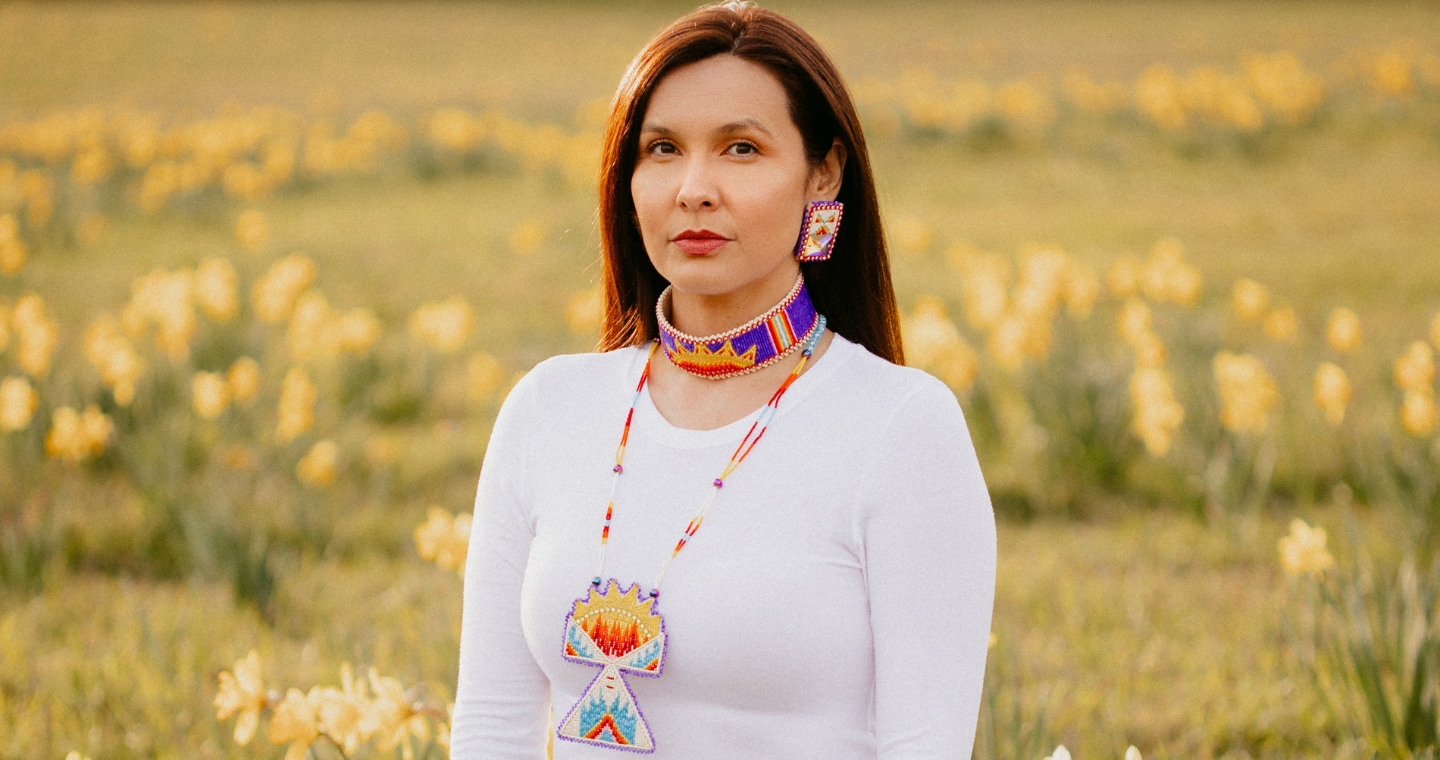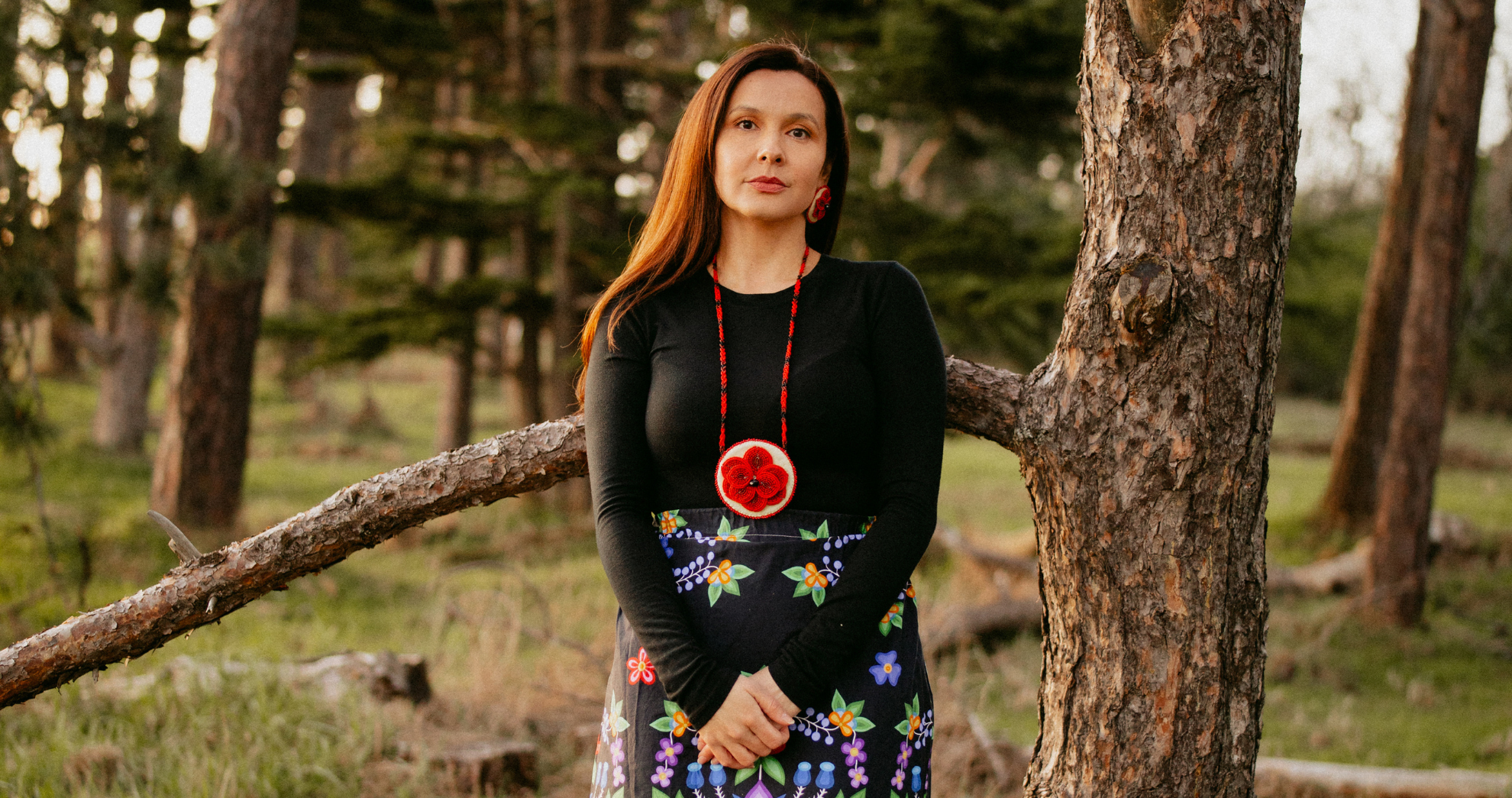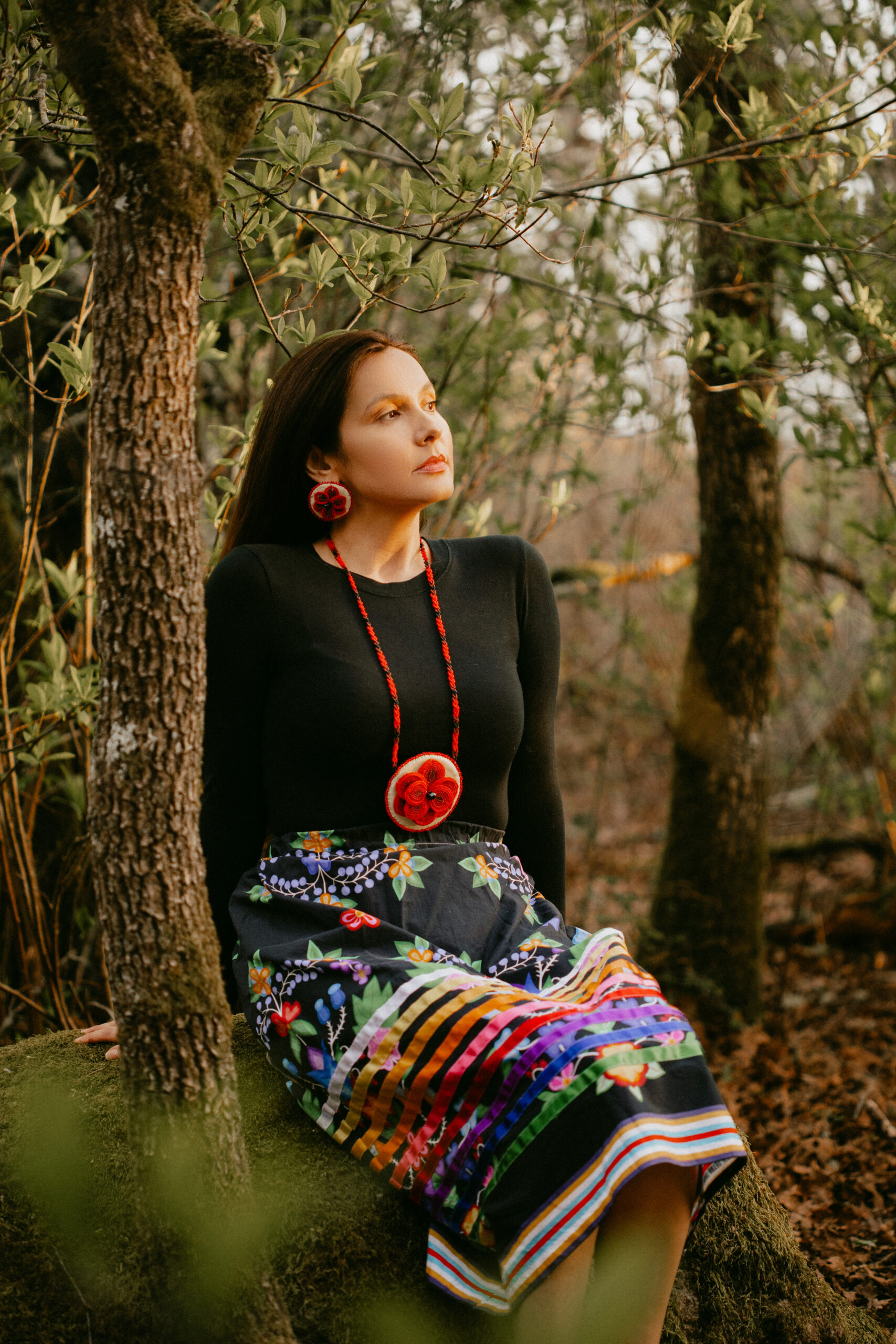Written by: kelsie kilawna
Photos by: Georgie Lawson
Melina’s introduction protocol:
With her father’s memories seeped into her own, Melina would close her eyes and envision his feet stepping into the Elders’ medicine cabin, his gaze drawn to the plants hanging from the wooden beams. It was a place that had cradled him in his childhood, where he developed a deep kinship with community medicine. The air was thick with the earthy aroma of dried boreal plants, their gentle scents intertwining to evoke memories of how the Elders cared for the people’s health and well-being. As his feet tread softly on the worn wooden floorboards, the whispered prayers of generations past resonated within him, a calling that transcended time and now lived deeply in the heart of his daughter, Melina.
Melina Laboucan-Massimo, Nêhiyaw, was steeped in the stories all around her, riding on a horse and wagon with her grandparents during family visits to the community cabins, which had long since been underused due to government policies that were enacted which prevented cultural practices after the colonial interruption.
Her upbringing was marked by visits to her aunts, uncles and grandparent’s homes, where many people came to visit, and conversations flowed freely, guided by a deep sense of care and love. In her homelands time seemed to stand still.
From the roots of activism as a youth worker in inner-city Indigenous communities, to the relentless pursuit of social and environmental justice in her Cree homelands, Melina’s story is one that holds deep and significant teachings. It is a narrative that all too many Indigenous caretakers carry when they put their bodies between the land and their people as an act of love through the protection of the generations past, present, and to come. It intertwines personal kinship with trauma and a responsibility as a Nêhiyaw to protect homelands — a journey marked by the truth that Indigenous communities live with long-term and repeated exposure to colonial harm.
Melina is from the Cree-speaking community of Little Buffalo, in what has been very briefly known by settlers as Alberta, and is situated within the Lubicon Lake Band on Treaty 8 Territory. She was the recipient of the Healing Justice Sabbatical, supported through the Womxn’s Leadership Collective for Nature and Climate Action — a partnership between Systems Sanctuary, Turtle Island Institute, WAGE, and MakeWay to bring together women-identified and gender diverse changemakers to advance innovative climate solutions.
We sat down with Melina to hear her story, including the breaking point that forced her to reconsider the colonial concept of hyperproductivity leading to burn out (and a long term medical condition) which ignited a time of reflection on the very essence of activism while being bedridden. The Healing Justice Sabbatical became a pivotal chapter, where Melina confronted the need for self-care and collective healing, and then set out on a journey where the message became clear: there needs to be a break in the cycle of harm entrenched within the activist community. The burden of social injustices weigh heavily upon the bodies, minds and spirits of those who are striving to leave the world in a better place than they found it.

Roots of Activism
“My experience as a child was being on the land traditionally,” says Melina.
“I feel from a very young age that I came here with a clear mission… I just knew deeply that something was off about the world…and that I was brought here to bring more peace and healing.”
“My reality was being born into a community of poverty, yet I never felt impoverished as I was surrounded by the abundance of the land, language and teachings. Sure, growing up was slop pails and outhouses, that was just where I’m from. My family and community had no running water until 10 years ago. There was no financial wealth even though I witnessed so much wealth being generated from our homeland which I saw accumulate in the surrounding towns and cities,” Melina remembers.
As a child Melina recalls being involved in politics at a young age, beginning her journey to upholding her responsibilities to her people, land, and water on the frontlines of activism.
“When I was seven, we had a blockade — my family and community, all of us were on the frontline, and this was in 1988. Those are some of my early experiences as a child,” Melina reflects.
“That, for me, just politicized me very early. The injustice and the inequality that existed for our people, was really what’s driven me for a really very long time.”
Working in environmental campaigning, Melina faced the harsh realities of her community’s struggles against industries like tar sands extraction. The echoes of her childhood, marked with witnessing the vast vibrant beauty of her homelands from horse-drawn wagons, to then become dried out watersheds, impacted by industry and deforestation, fueled her passion to protect homelands.
Melina’s community, Little Buffalo, was only 30 kilometres away from Alberta’s second largest oil spill northeast of Peace River. Her relations found themselves engulfed in a noxious haze emitted by the leaking crude, inducing nausea, eye irritation, and pounding headaches that intruded upon every daily activity. As the community school doors swung shut and children were confined to their homes, the atmosphere hung heavy with fear and uncertainty. This along with the ever expanding industrialization of their homelands began to eroded the sense of security and deeply grounded connection to land, now being drowned out by the relentless hum of industrial heavy haul trucks barreling through their territory and the ever present ecological neglect echoing through the land despite the continual objections from her community.
“My memories of seeing the land in its beauty, I think, is why I fought so hard for a long time trying to protect our homelands,” says Melina.
“And so this trauma that you’re carrying with trying to fix the crisis, while at the same being exposed to the crisis, you’re experiencing the trauma directly and often without support.”
Driven by her responsibility of her spirit’s knowing, Melina became a relentless activist, pushing herself beyond limits for decades. The toll of her wellbeing that is often unspoken of became evident to her as she navigated extended trauma and vicarious trauma that exist within Indigenous, Black, and Kin of Colour communities.
The Breaking Point and Reflection

Melina’s journey through her work was marked by immense sacrifice and exposure to trauma. Instead of being stationary, she was perpetually on the move—travelling to testify in US Congress, preparing speeches across so called Canada, US and Europe, and living out of a suitcase. This relentless pace involved constant travel and high-profile pressures, which were deeply overwhelming as often the only young Indigenous women. She travelled the world, urging people to divest from harmful industries fuelling the climate crisis, often attending and speaking at multiple events on a daily basis. The non-stop activity blurred together, leading to severe burnout, with little support available for the monumental tasks she faced.
The experience was akin to being “sent into the lions’ den” repeatedly, often as the sole young Indigenous person in predominantly white spaces. And often as the sole Indigenous women in male dominated spaces. This isolation compounded the psychological impact, creating a deeply stressful environment.
For 20 years, Melina was repeatedly immersed in the trauma she sought to heal, carrying the weight of these experiences while also pursuing academic degrees. In the midst of her climate and environmental advocacy, her younger sister was found dead in Toronto which then began her work on the issue of Murdered and Missing Indigenous Relatives. The trauma of working on her sister’s unsolved case for several years strengthened her conviction and pursuit for justice, but ultimately pushing her beyond her breaking point. This cumulative trauma necessitated a profound reckoning, guiding her toward a much-needed prioritization of deep self-care and healing.
Becoming bedridden became her wake-up call, prompting Melina to understand successive bouts of burnout shouldn’t be normalized and there needed to be a profound shift in her approach to activism.
“I thought to myself, after experiencing all of this, I can’t keep pushing my body this way. And I can’t allow other people to keep pushing my body this way. If I keep saying ‘yes,’ it is actually detrimental to my health and my well being,” Melina reflected after spending years doing climate and environmental campaign work.
“I think with trauma that we experienced in our lives as Indigenous Peoples, we often internalize emotions and experiences that we do not share with the world, and instead we keep that stored within our bodies to the detriment of ourselves.”
“Ableism thrives within our society and also in our movement spaces, which I find exhausting to be around. Even when I try to communicate the medical diagnosis I now have from this work, people often dismiss it with superficial comments like ‘well, you look great,’ or calling me ‘delicate’ after literally decades of me putting my body on the line having no choice but to be strong – there is a failing to acknowledge the cumulative impact BIPOC bodies face which is a daily lived reality,” she says while tearing up.
For Melina, the Healing Justice Sabbatical was integral to understanding the complex health-related impacts of the work she was doing.
“The sabbatical was a much-needed pause from my workaholic tendencies, allowing me to confront the real impacts of this work, especially for those on the frontlines. People praise our strength without truly understanding the burdens we carry, which manifest into severe physical health issues, mental health issues, and high suicide rates, which are part of our daily reality beyond the work we do. I think often about those who have passed on and wish there would have been more community support to them.”
“I feel this immense desire to share about this experience, so more people don’t have to suffer the very real impact created by the nonprofit industrial complex, and often philanthropy that thinks that they know what is best for our communities and our people when they honestly have never experienced what we go through as Indigenous peoples,” says Melina.
The Healing Justice Sabbatical
Beginning her journey on her Healing Justice sabbatical, Melina confronted the need for reflection and collective care after receiving her medical diagnosis.
“I now have an immuno-compromising disease called ME/CFS, which is basically like fibromyalgia. And it’s from long term impact from the work I dedicated my entire life to, and it’s something that I have to learn how to live with for the rest of my life,” Melina shares.
The term Myalgic Encephalomyelitis can be broken down as “My” referring to muscle and “algic” to pain. “Encephalo” referring to the brain, “myel” to spinal cord and “itlis” denotes inflammation. ME is an acquired illness that affects all body systems; predominantly the neurological, endocrine and immune systems. It is classified as a neurological illness in the World Health Organization (WHO) International Classification of Diseases and can be severely debilitating.
Living with ME/CFS can be frustrating, as symptoms significantly impact daily life, and there is no quick cure. However, establishing a strong relationship with a healthcare team who understands the condition is crucial for managing symptoms and improving quality of life which is often hard to find.
For Melina, after repeated burnouts that turned into hospitalizations, she entered somatic training and was introduced to integrative medical health professions became a point of hope—a commitment to instilling bodily awareness and honouring her kinship with trauma and grief over her homelands. Melina’s vulnerability revealed the transformative power of collective care, which serves as a reminder that building genuine connections is vital for health.
When Melina was offered the Healing Justice Sabbatical, it followed her doctor’s requirement for her to take a medically-mandated leave from her work. During this period, her exploration of somatic therapies underscored her commitment to dismantling the entrenched cycles of harm within the activist community.

Somatic therapy is a form of therapy that focuses on the mind-body connection, much of which has roots in Indigenous Ways of Being. Melina uses it to address the physical, mental, emotional, and spiritual impacts of her work, integrating practices that help her reconnect with her body and manage stress.
“Just being able to actually get the Healing Justice Sabbatical helped me be able to put up boundaries. I think, a lot of times, we’re not given permission, even by ourselves, to rest. I realized from the experiences of being bedridden as I continue to build Indigenous-led organizations, that it is crucial we include Healing Justice as a tenet of our work not only for the wider community, but for the staff who work with us.”
“The Healing Justice Sabbatical was a relief because it allowed me to not be financially tied to an organization, freeing me from the sense of obligation that comes with being on salary or contract. This newfound freedom allowed me to untangle myself and prioritize my well-being; a necessary step that I knew I needed to take,” says Melina.
Healing is a journey that requires collective care
When asked if she could give her younger self any advice, Melina reflected, “listen to your deep knowing, trust your intuition and keep your spirit in your body. I’ve noticed that if you are not cognizant when working in high-stress spaces, your spirit might not feel tended to and eventually you can become a shell of who you were. Using personal ceremony, in whatever way you can, is critical to maintaining your well-being, honouring self and calling your spirit back.”
“We hear terms like environmental racism, that may be solely concepts for a lot of people, but environmental racism lives in my body and is a toxic burden that not only myself but many community members face from exposure to toxic industries,” she says.
“Teaching our young people to understand how trauma disconnects us from our bodies and how to safely feel and be back in their bodies somatically, is so important.”
Back in her homelands, stepping onto the land, Melina’s feet connect with the soil beneath, a tangible link to her ancestors and their teachings. The landscape stretches out before her and in that moment, she embodies the teachings of her people, guiding each step and grounding her in what it means to be— Nêhiyaw.
Melina’s journey – from her time as a child in their homelands, to the blockade lines of her youth, to the corridors of activism – epitomizes the teachings found in moments of vulnerability and the healing power of collective care and nurturing genuine community connections. Rooted in her Nêhiyaw identity, Melina embraces her responsibilities to care for the collective which also comes in the form of rest, understanding that wellness lies not in sacrifice but in honouring the teachings of her Elders who cared deeply for their communities’ well-being.
As she reflects on her path, she shares what she’s learned: “We are not the sacrifice, we are the altar.”
About the Writer:
kelsie kilawna, a syilx and Secwepemc woman, who lives on her syilx homelands, briefly referred to by guests as the “Okanagan.” Her writing style embodies her commitment and duty to uphold the well-being of her people through respectful storytelling. kelsie recognizes the shared responsibility among all sqilx’w to be caretakers of the land and so ensures she nurtures the relationships her community has cultivated with other Nations by sharing stories in a good way that honours and respects all.
